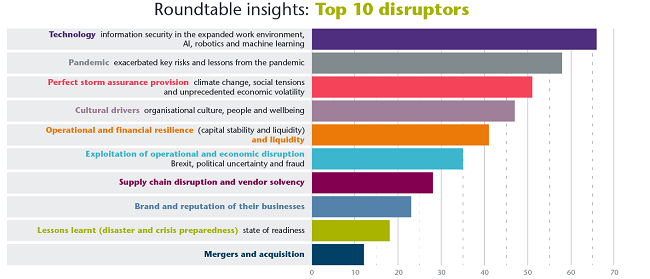Disruption: Roundtable insights
To find out how organisations and internal audit have fared during the pandemic, we partnered with Protiviti to host a series of roundtables with chief audit executives (CAEs). The findings of which are outlined below.
The key aims of these roundtable discussions have been to gain insights from CAEs on how they and their teams have responded to the following challenges:
- The events of the past year have caused unparalleled disruptions for businesses, sectors and markets across the globe. With 72 per cent indicating that their organisation has been disrupted by a different source other than the pandemic, what might these other sources of disruption be?
- Internal audit is in a unique position to help identify disruptions and support businesses, so that they emerge stronger and more resilient in such disruptive periods. But to what degree has internal audit supported business in this regard and how?
- Disruption has led many to trial new approaches and think differently. With this mind, what does internal audit innovation look like?
- Do internal auditors feel sufficiently equipped and prepared for a dynamic world?
Research by ourselves and Protiviti shows that executives are acutely aware of the disruption threats e.g. start-up, cybersecurity attacks, climate change, etc.. Yet disruption threats continue to take many companies by surprise in terms of their impact. As such, disruption threats keep the issue of survival at the top of a board’s risk agenda.
It follows that internal audit plays a key role in identifying potential disruption and the opportunities it may present.
The approach
A total of seven roundtables were conducted and, during them, we explored how the internal audit profession and organisations continue to be disrupted.
We invited those attending to explore with us how the profession can reimagine its approaches and to consider the measures being taken to respond to future business disruption risks. We also looked at how to harness the opportunities that disruption presents.
The roundtables started with a polling question that asked attendees to rate the following sources on organisational disruption in priority order. And to base those ratings on the challenges that they’re facing as organisations.
- Technology – information security in the expanded work environment, AI, robotics and machine learning
- Pandemic – exacerbated key risks and lessons from the pandemic
- Perfect storm assurance provision – climate change, social tensions and unprecedented economic volatility
- Cultural drivers – organisational culture, people and wellbeing
- Operational and financial resilience (capital stability and liquidity) and liquidity
- Exploitation of operational and economic disruption – Brexit, political uncertainty and fraud
- Supply chain disruption and vendor solvency
- Brand and reputation of their businesses
- Lessons learnt (disaster and crisis preparedness) state of readiness
- Mergers and acquisition
The results
The collective results from all seven roundtables are as follows:
*Click thumbnail to enlarge graph
Closing thoughts
Our findings indicate that several businesses and CAEs had already started preparing for the pandemic and its disruptive wave before it even arrived. But even innovation leaders must recalibrate for a post-COVID-19 environment.
As we continue to move ahead, amid significant uncertainty, internal audit activities will likely remain consumed by near-term COVID-19-related priorities.
However, now is a great opportunity to explore potential efficiency initiatives and a plan to reimagine internal audit activities for a more uncertain and complex commercial landscape.










